|
|
|
Istanbul movie intermission
Tuesday, October 11 2005
setting: Old City, Istanbul, Turkey
We went through a little added tsuris this morning trying to get our hotel to do the thing arranged last night by Gretchen's father, that is, giving us a cash advance against additional money added to our hotel bill. At this stage of the vacation we actually encountered an additional problem with one of our two problematic pieces of wallet plastic. The Chase card, which is badly worn and has been on its last legs for months, couldn't be read by the hotel's card reader. For some reason (and this seemed suspicious to Gretchen and me) the hotel manager could type in the numbers manually, but this would cost him six percent of the value of the transaction, and he insisted on passing this cost on to us. We raised a fuss and did what we could to resist this ridiculousness, but ultimately he was the one who was in charge of the situation (since the Chase card was the only functioning card we had in Turkey). So we sucked it up and paid him the six percent, figuring there was a chance he was being sincere and wasn't actually ripping us off.
Superficially, the streets of Istanbul could pass for those in the cities of the West, but there are fundamental differences here that don't take much prodding before bubbling to the surface. For starters, there's the impenetrability of the language, which sounds to the ear like it's made of the same stuff as familiar European languages (particularly English). But it bears so little relationship to Latin and Germanic languages, or even Semetic languages, that it's as if it was developed on another planet. It's hard to imagine any common ancestor for words as different as, say, "iki" and "two" or "evet" and "yes."
The Turks' language developed in relative isolation out on the arid steppes of Central Asia, a huge salt water lake and a high mountain range away from the steppes north of the Black Sea where Indo European supposedly developed. Turks adopted Islam from the Arabs before their contact with the West. Over the pat thousand years, though, the Turks have had constant contact with the West and the Ottomans, who settled down and became a great European power, have been in intimate contact with the West for the past 500 years. You might imagine, then, that aside from language and religion, Turkey would seem fairly Western. God knows they try, or at least Atatürk (the founder of modern Turkey) tried. His decisions led to a general purge of Arabic and Persian words from the language, to an abandoning of Arabic script in favor of Roman characters for the writing of the language, and to a systematic secularization of society. That secularization included the conversion of Hagia Sofia into a museum, the banning of head scarves worn by women in schools and in government jobs, and the use of Turkish instead of Arabic in religious services.
Still, you could be walking around deaf and still see that Turkey is not the West. For starters, the relationship between the genders is entirely different here from the way it is in, say, Paris or Boston. Men and women in Turkey are rarely seen together except in family groups or as part of ongoing romantic relationships. Instead, people tend to segregate according to gender and publicly display intimacies that would be considered strange or taboo in the West. It's very common, for example, to see two men walking down the street with one keeping his hand snuggled into the crook of the other's elbow. The only circumstances where this would be considered acceptable in, say, Chigago would be late at night if both men were very drunk. But these men in Turkey are often seen walking around like this in the middle of the day, completely sober. Men are not afraid to show their affection for one another here, and this reflects distinctly Middle Eastern mores, ones (incidentally) you'll never see on display among Jews in Isræl. (I've heard on This American Life the story of a commander of a team of mercenaries in Iraq who is, among other things, trying to get Iraqi men to stop walking around arm-in-arm like this because it "ain't right." I'm sure he's not the only one in Iraq getting exercised about charming customs that offend arbitrary American sensibilities. I wouldn't be surprised to learn, for example, that some well-meaning American is spending his days trying to get Iraqis to grow and mow lawns.)
Perhaps more disconcerting and even a little ominous, at least for secularists such as ourselves, is the pervasive presence of Islam. Turkey does its best to conform to the norms of Western secularism, a tendency that the Ottomans can be said to have pioneered in Europe (with their relatively early embrace of religious tolerance). But Islam is a difficult starting point for secularism, owing to its origin as both a religion and an empire in an arid region that didn't have experience with conventional government. Its fundamental tenets call for its spread throughout the world and in many places in the world to which it spread there was no distinction between religious and governmental laws and authorities. These are all issues that were hashed out a long time ago in Christian Europe, which has a long tradition of separation between church and state even in countries that still have state religions. Christianity had its origins in the context of the Roman Empire at its peak and the separation of church and state can be traced back to scripture: "Render therefore unto Cæsar the things which are Cæsar's, and unto God the things that are God's." -Matthew 22:21.
The Islamic Ottomans inherited Constantinople from what was essentially the remains of the Roman Empire, and the process of becoming an urban-based Islamic empire probably had a role in molding their views of religious tolerance. Nonetheless, Islamicizing their conquests was just a well-deserved spoil of war. The Ottomans turned Hagia Sophia into a mosque, but they carefully preserved the Christian mosaics even as they plastered over them. Islam came to be their way of demonstrating art and grandeur to their people, as the many sultan-commissioned mosques of Istanbul testify. In modern Istanbul, the mosques seem like the legacy of some runaway McDonalds-scale franchise. Of course they're much more tasteful than any burger chain, but in a grim alien-reptile kind of way. Their sheer number and unnerving similarity one to the next is enough to set off Gretchen's swarm-revulsion reflex. (She tends to be uncomfortable with multiple near-identical copies of anything, be they cicadas, blackbirds, or tadpoles.)
Gretchen and I went into several more mosques today, both going to and coming back from Istanbul's Contemporary Art Museum (view their perpetually-hacked website here). The biggest of these was the dual minaretted New Mosque just south of the Galata Bridge. Each mosque was smaller and less ornate than the one before, though none was really all that small or plain. In the smallest ones the prayer floor began right at doorway and, not wanting to violate its sanctity with our infidel socks, we stood in the doorway. We ducked into the last one just after a call to prayer and saw all the men on their knees doing the Muslim prayer thing. It really drove home to Gretchen how simple it all was: just a big empty room with a carpet and no furniture and guys on their knees facing more or less south towards Mecca, where a similarly-empty room is the focus of all of the world's Islamic prayer.
The Contemporary Art Museum was so inexpensive that we could afford to pay the admission with cash. The price probably reflected an equilibrium between supply and demand; not many people come to Istanbul wanting to see new stuff.
There was a lot of good, interesting art in the museum, but all of the artists were Turkish and I didn't recognize any of them. The most flamboyant of them was a woman who had smashed holes in panes of glass which had then been sheathed in plastic and used to enclose the museum's main stairway. Another amazing piece of environmental art was a dropped ceiling in the basement made of several thousand books suspended from the ceiling by cables. There was also an interactive exhibit of color xeroxes made by museum guests. People had xeroxed their faces and pocket contents and stuck the images to the wall. So of course Gretchen and I had to make our own contribution.
After all these days of relentless travel, I needed a little downtime, a little vacation away from the vacation if you know what I mean. So while Gretchen was off getting a real Turkish Bath, I headed back to the hotel, stopping along the way to get some beers at a little corner store (typical of Ramadan, the cashier was fast asleep when I walked in). The generic beer of Turkey, by the way, is something called Efes Pilsner which is a good bit lighter than most American microbrew lagers but is rather good.
After Gretchen came back to the hotel, we decided to eat Indian food at a restaurant she'd read about near Hagia Sophia. Afterwards she wanted to see The Wedding Crashers because, she says, it's always a hoot to see a dumb American movie in a foreign country.
At the Indian restaurant, a place called Dubb, we split a whole bottle of wine over a variety of vegetarian options, all of which were good. When the call to prayer echoed across the land, one of the waiters propped open the window so the customers, nearly all of whom were tourists like us, could hear it better.
Gretchen is experienced with seeing movies in other countries, and she gave me a heads-up about unusual things to expect, so none of the things I'm about to mention came as much of a surprise. First of all, there were only about four or six other people in the theatre with us, though it was fairly large one. The film started soon after we sat down, without any previews or advertisements. Then, about half way into the movie the film ran out, the projector stopped, and the lights came up. It was, believe it or not, intermission. They apparently hadn't mastered the fine art of syncing the other can of film on another projector and seamlessly switching over.
After the film was over, the projector was switched off early in the credits and the lights were switched on. But we hadn't even made it out of the room yet when the lights were switched off again. By now the whole theatre was dark and we wouldn't have even been able to get out of the building (which had already been locked) had it not been for the fact that the theatre's manager happened to be coming out right behind us. I could understand why Gretchen had wanted me to have this experience.
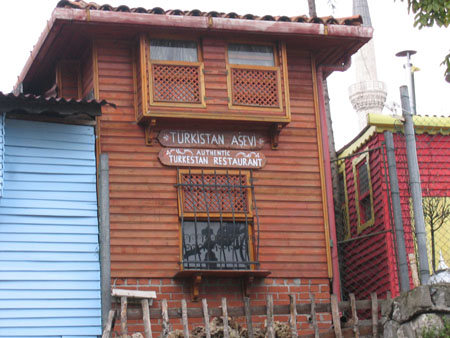
The place where we saw Esat Kabaklı last night. Evidently it claims to be a Turkistani haunt. In the background is one of the Blue Mosque's minarets.
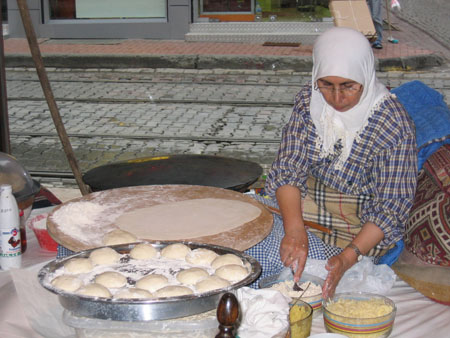
This morning we had "pancakes" (flatbread) at a restaurant in downtown Istanbul that featured a costumed woman making the bread in the front window. (As a prop for her costume, a plastic baby doll lay in a cradle suspended from the ceiling.)
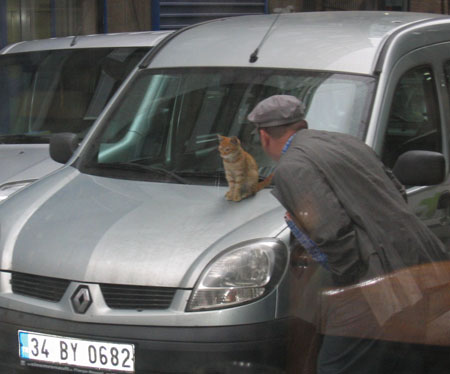
A little Clarence-style kitten was a featured attraction outside our breakfast restaurant this morning.
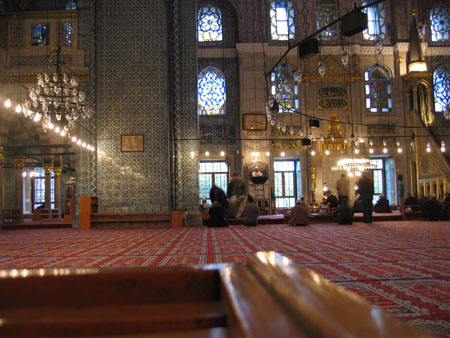
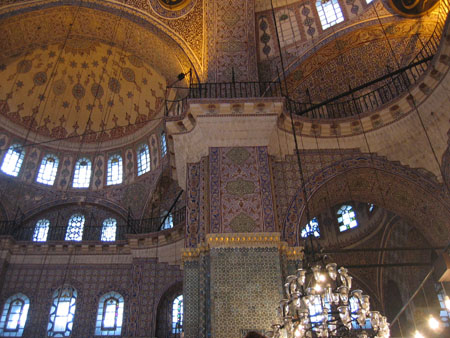
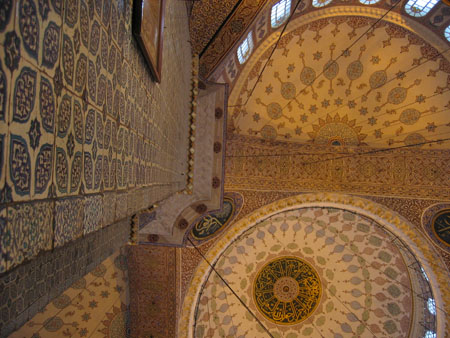
Inside the New Mosque.
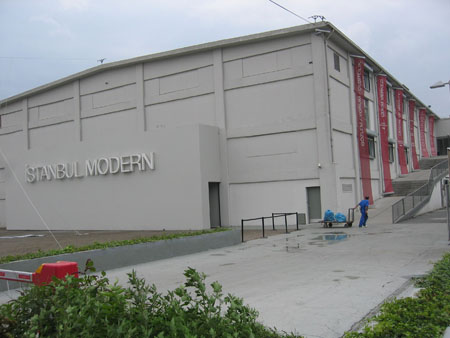
Outside Istanbul's Contemporary Art Museum. Its name is featured most prominently in English.
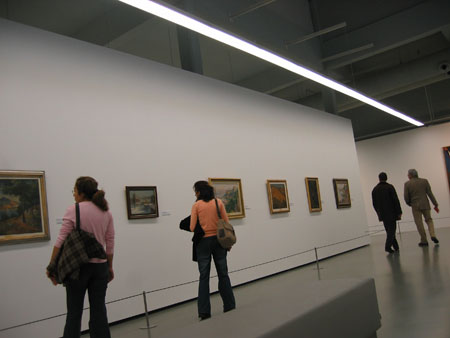
People appreciating art in Istanbul's Contemporary Art Museum.

The "dropped ceiling" of books in Istanbul's Contemporary Art Museum.
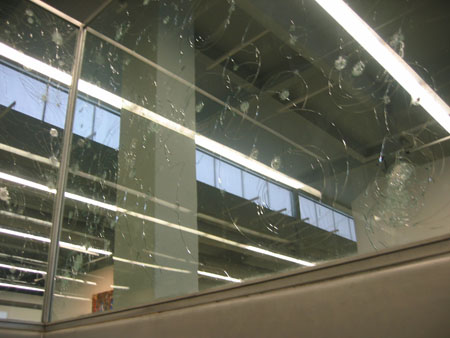
Smashed glass around Istanbul's Contemporary Art Museum's main stairway.
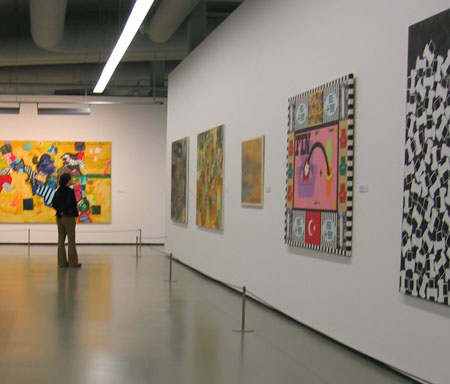
Gretchen appreciates some art in Istanbul's Contemporary Art Museum.
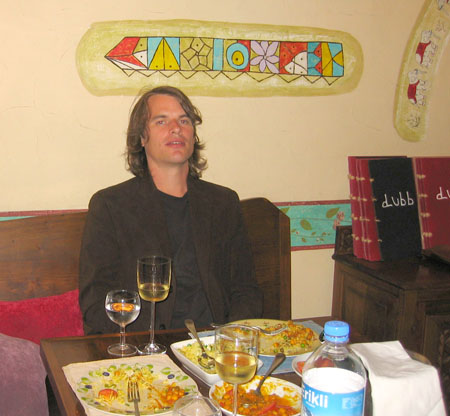
Me at the Indian Restaurant tonight.
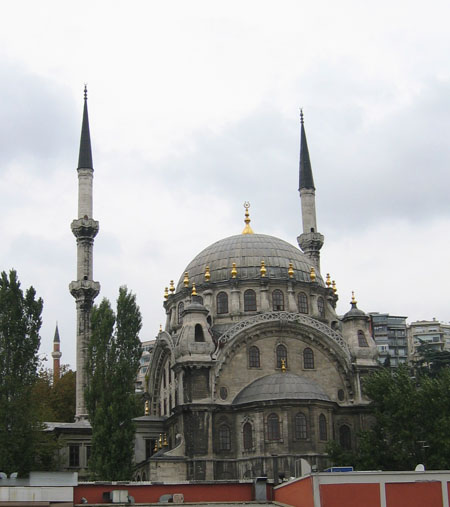
Outside an exquisite mosque near Istanbul's Contemporary Art Museum.
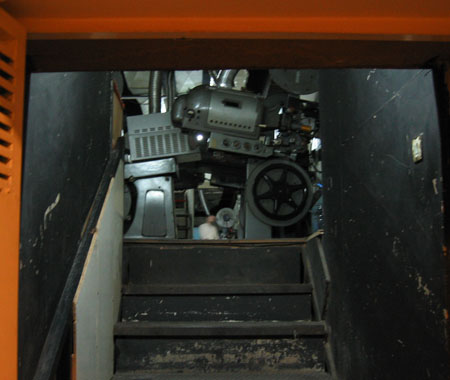
A peek into the projection room at the movie theatre tonight during "intermission."
For linking purposes this article's URL is:
http://asecular.com/blog.php?051011 feedback
previous | next |













